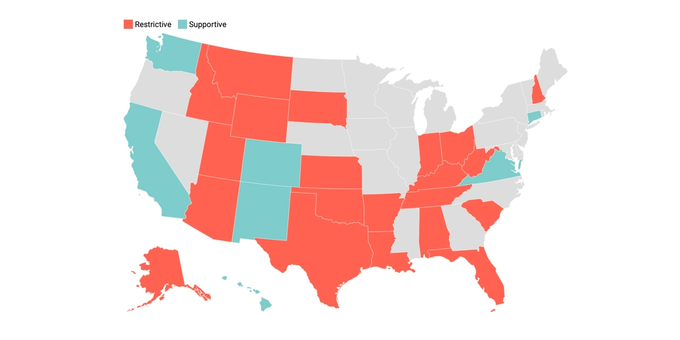They Belong to Us
In the intervening 48 years since Roe, more than 1,300 pieces of legislation have been enacted nationwide with the express aim of restricting a woman’s access to abortion.
by Susan E. Stutz

Art by Andrea Arroyo
On January 21, 1973, Justice Harry Blackmun delivered the majority opinion in Roe v. Wade, codifying into law a women’s right to the governance of her reproductive system. The battle for female reproductive autonomy was hard-fought, and SCOTUS’ opinion should have resolved the issue once and for all. Sadly, that was not the case. Despite Roe and the multitude of other settled cases reaffirming a women’s right to choose, the war on women’s reproductive rights has raged ever on.
At the same time, there has never been a single solitary piece of legislation aimed at men’s reproductive rights. While women may have multiple partners, they can only produce one full-term pregnancy at a time. Conversely, men who have multiple partners can have a child with every single woman with whom they have sex. But, no, men’s reproductive rights have never been in dispute. And, for each of those pregnancies, the male is often allowed to remain unsupportive and bear no responsibility. The female is almost always left to bear the brunt of responsibility for an unwanted or unplanned pregnancy. At the same time, men in glass houses determine whether or not they have the right to decide for themselves when to procreate.
In the intervening 48 years since Roe, more than 1,300 pieces of legislation have been enacted nationwide with the express aim of restricting a woman’s access to abortion. As of June 2021, there have been 561 abortion bills introduced this year alone, with just shy of 100 enacted. And, the majority of those new laws are in states that already have very restrictive abortion laws, making abortion even harder to access.
States that have enacted abortion-supportive or abortion-restrictive laws in 2021

Map: Center for American Progress • Source: Author's calculation based on data compiled by the Guttmacher Institute as of September 2021.
The fallout from the ever-increasing restrictions is that pregnant people are forced to have unplanned births. The alternatives are to have a potentially fatal back-alley abortion or travel to more compassionate states. But there are costs associated with travel, no matter how close the next state may be. For less privileged individuals, who already face financial and personal obstacles to reproductive care, the need to travel and incur additional costs puts this health care—and make no mistake, abortions are essential healthcare—out of reach. Also, people coming in from other states overload the physicians and facilities in those pro-choice states, which could mean that an abortion may not be possible as doctors and clinics can only see so many patients on any given day.
For the most part, the enacted and pending legislation is not in step with the majority of the American public who do not want Roe overturned. According to the Pew Research Center, 61% of Americans want abortion to be legal. The legislation being passed in states around the country panders to a shrinking minority at the expense of the health and wellbeing of the rest of us. The cornerstone of Democracy is majority rule, and this is not it.
Many of the new laws will not pass muster with the Courts; however, it is not unreasonable to assume that it makes no difference to anti-choice individuals which case fails and succeeds so long as any one of them makes it to the Supreme Court. The aim is to reverse Roe. Period. And, while the cases are litigated, women will be harmed by the lack of access to abortion.
Furthermore, and most importantly, outlawing abortion will not end abortion. It will only end safe abortions. Women from every walk of life have been faced with the need to end a pregnancy since time began. When the need arises, they will find a way. It may lead to their death. Surely we are more than just walking incubators? Surely our lives matter?
At the same time that more restrictive legislation is making its way through our states, two bills are pending in Congress that could bring an end to state interference with a woman’s right to an abortion. These pieces of legislation have the potential to end the fight over freedom of choice and to finally recognize a woman’s right to be the arbiter of her own body. Our bodies, after all, belong to us.
Women’s Health Protection Act (2021)
Cosponsored by 47 senators, S.1975 prohibits the establishment of state law that hinders a woman’s ability to exercise her constitutionally protected right to obtain an abortion. The bill also limits how states can restrict abortion, striking state laws that require extraneous tests, additional appointments at far-flung clinics, and unnecessary waiting periods between medical appointments.
EACH Woman Act (2021)
With 28 cosponsors, S.1021 would lift the restrictions enacted by the Hyde Amendment, which bars the use of federal money to pay for abortion coverage (except for extremely limited cases of rape, incest, or life endangerment) for people who are covered by Medicaid or Medicare. Because of inequities inherent in Medicaid, BIPOC are disproportionately subject to the Hyde Amendment.
Weigh In
Reach out to your legislators by sending congress or state to Resistbot on iMessage, Messenger, Telegram or Twitter. If none of those work for you, Resistbot also supports old-fashioned SMS: text RESIST to 50409 to get started. It takes 2 minutes to make a difference.
And, join us on Sunday, November 14 at 1 pm ET on Resistbot Live when we will be talking to Laura Goodhue, Executive Director of the Florida Alliance of Planned Parenthood Affiliates.
Support the ’bot!
Upgrade to premium for AI-writing, daily front pages, a custom keyword, and tons of features for members only. Or buy one-time coins to upgrade your deliveries to fax or postal mail, or to promote campaigns you care about!
Upgrade to PremiumBuy Coins